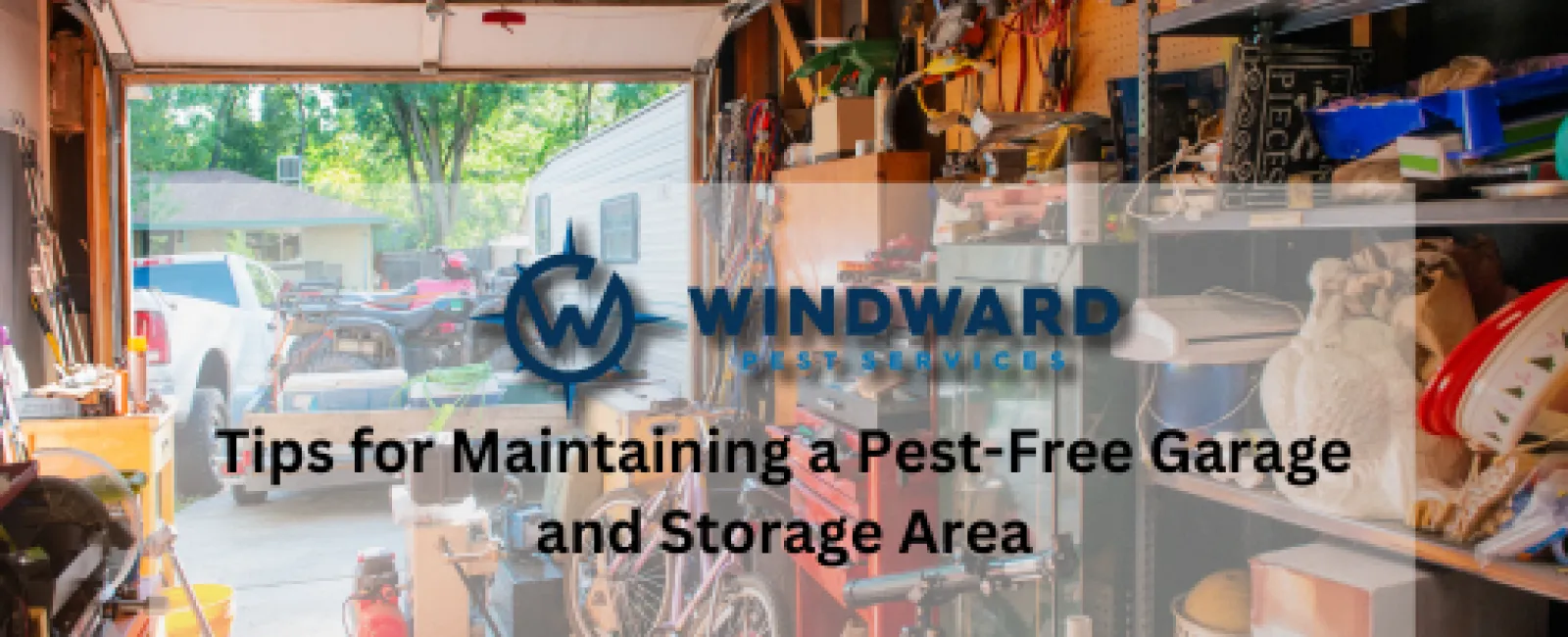A garage or storage area is often a prime location for pests to infiltrate your home. These spaces are usually less frequented, poorly insulated, and filled with clutter, making them ideal hiding spots for unwanted invaders. Maintaining a pest-free garage and storage area is essential not only for protecting your belongings but also for keeping pests from making their way into the rest of your home. Whether it's rodents, insects, or even larger pests, these areas can become breeding grounds if not properly maintained.
At Windward Pest Services, we provide comprehensive Atlanta pest control solutions to help homeowners maintain a pest-free environment, including garages and storage areas. Our Atlanta residential and commercial pest services are designed to target Georgia pests that commonly infest these areas, offering both prevention and treatment options to protect your property.
Why Garages and Storage Areas Are Vulnerable to Pests
Garages and storage areas are often unheated, poorly sealed, and cluttered, creating ideal conditions for pests to thrive. These spaces provide pests with the three essentials they need: food, water, and shelter. Unlike frequently used rooms in a home, garages and storage areas tend to be less disturbed, allowing pests to go undetected for longer periods. Clutter, such as cardboard boxes, old furniture, and seasonal storage items, offers excellent nesting materials for rodents, insects, and other pests. In fact, pests like spiders, silverfish, and mice are commonly found making homes within stored items, particularly in dark, undisturbed corners.
Entry Points and Access to Shelter
- Garages and storage areas are also vulnerable due to the many entry points available to pests. Gaps around garage doors, small cracks in the foundation, and improperly sealed windows or vents provide easy access for pests to enter undetected. These spaces are often less secure than the rest of the home, with doors left open or weatherstripping worn down, making it even easier for pests to move in. Once inside, pests such as rodents, ants, and cockroaches can build nests, breed, and remain relatively safe from predators or environmental changes.
Food Sources and Attractants
- Garages often contain items that attract pests, such as pet food, trash cans, birdseed, and recycling bins. Even small crumbs or spills can be enough to draw in ants, rodents, and cockroaches. Items like pet food bags, improperly sealed trash, or uncleaned food containers left in garages or storage areas become an easily accessible food source for these pests. Additionally, organic materials stored in garages, such as gardening supplies or mulch, can attract termites and other insects looking for cellulose-rich food.
Moisture and Water Sources
- Pests are also drawn to moisture, which is often present in garages and storage areas. Leaky pipes, condensation, or poor drainage can create damp conditions that attract pests such as termites, silverfish, and cockroaches. Standing water or excess humidity in these areas can also lead to mold growth, which further attracts pests that thrive in moist environments. In humid regions like Atlanta, the combination of moisture and a warm environment makes garages and storage areas even more susceptible to infestation.
Seasonal Pest Behavior
- During colder months, garages and storage spaces become prime locations for pests seeking warmth and shelter. Rodents, spiders, and other pests often move indoors to escape the cold, and garages provide an easy entry point. In warmer months, pests like wasps and spiders may seek out the shade and protection that garages offer from the heat. Without regular inspections, these pests can build nests, reproduce, and cause damage before they are noticed.
Preventing Infestations
- To prevent infestations in garages and storage areas, it's essential to implement effective pest control measures. This includes sealing gaps and cracks, regularly cleaning and decluttering the area, and storing food and other attractants in pest-proof containers. Additionally, using professional Atlanta interior and exterior pest treatments can help eliminate existing pests and protect your home from future invasions. Regular inspections by pest control experts can identify potential entry points and areas of vulnerability, ensuring that your garage and storage spaces remain pest-free year-round.
Tips for Maintaining a Pest-Free Garage and Storage Area
To ensure your garage and storage area remain pest-free, it's important to adopt proactive pest prevention measures. Here are several tips that can help you keep pests at bay:
Declutter Regularly. One of the main reasons pests infest garages is due to clutter. Pests like to hide in dark, undisturbed places, so if your garage is filled with cardboard boxes, old clothes, and unused items, you're offering pests the perfect shelter. Organize your storage area by getting rid of items you no longer need and use plastic storage containers instead of cardboard. Cardboard is particularly attractive to pests, especially rodents and cockroaches, as it provides both food and shelter.
Seal Entry Points. Pests can enter your garage or storage area through tiny cracks and gaps around windows, doors, and the foundation. To prevent this, conduct a thorough inspection of your garage and seal any openings you find. Our Windward Pest Services pest inspections include checking for potential entry points where Georgia pests might infiltrate your home. Sealing these gaps with caulk, weatherstripping, or foam insulation can go a long way in keeping pests out.
Store Food and Pet Supplies Properly. If you store pet food, birdseed, or even human food in your garage, make sure it's kept in airtight containers. Pests are drawn to easily accessible food sources, and if left out, they will quickly infest your garage. Sealed containers make it difficult for pests like rodents and ants to access food, helping you avoid infestations.
Ensure Proper Ventilation and Humidity Control. Many pests, especially insects like silverfish and cockroaches, thrive in humid environments. Garages and storage areas are often damp, particularly if they lack proper ventilation. Install a dehumidifier or ensure proper airflow to reduce humidity levels in your garage. Regular Atlanta pest control inspections can help you identify and address moisture-related pest issues early on.
Install Pest Deterrents. Using pest deterrents such as traps, baits, and ultrasonic devices can help prevent infestations. For example, rodent traps can capture mice or rats before they establish nests in your garage. Additionally, natural pest repellents like peppermint oil or cedar blocks can be used to discourage insects and rodents from entering your storage areas.
Keep Garbage Contained. Many garages serve as a temporary storage spot for garbage cans and recycling bins, which can attract pests like raccoons, rodents, and flies. Make sure your garbage cans have tight-fitting lids and avoid storing trash in the garage for extended periods. If possible, place garbage cans outside or in a sealed area away from your garage.
Schedule Regular Pest Inspections. Routine Windward Pest Services pest inspections are crucial for detecting early signs of pest activity. Our experienced team provides thorough Atlanta interior and exterior pest treatments to prevent and eliminate infestations. Early detection can save you from the hassle and cost of dealing with a full-blown infestation in your garage or storage area.
Keeping your garage and storage area free of pests requires consistent effort, but it's a vital part of home maintenance. By decluttering, sealing entry points, and controlling moisture, you can create an environment that is less appealing to pests. Using these preventative tips, along with the professional services offered by Windward Pest Services, will help ensure your garage remains pest-free year-round.

